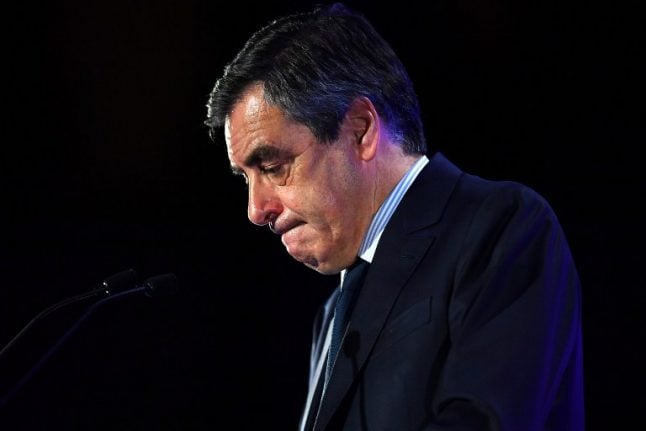The former prime minister was charged in March with misuse of public funds over the employment of his British-born wife Penelope as a parliamentary assistant for 15 years.
READ ALSO: Fillon's wife Penelope charged over fake jobs scandal
It was a severe blow to the 63-year-old, who clinched the nomination for the Republicans party — France's main centre-right party — in November by presenting himself as unsullied by the scandals that surrounded his rival and former boss, ex-president Nicolas Sarkozy.
The allegations that Penelope had earned €680,000 for a fictional role were first reported by Le Canard Enchainé newspaper in January.
Fillon's reaction was to strongly deny that either he or his wife had done anything wrong and to claim his left-wing rivals were operating a “secret cell” to blacken his name.
It was a response that drew scorn from Socialist President Francois Hollande and surprised even some of Fillon's allies.
After backtracking on an early promise to withdraw his candidacy if he was charged, Fillon found himself in the unlikely position of running as an anti-establishment rebel determined to defy the government, magistrates and
the media he said were working against him.
Subsequent revelations that a wealthy French-Lebanese lawyer bought handmade suits for Fillon worth €13,000 each drew further ire from his opponents.
In the end he trailed home in the first round of the election behind projected winners Emmanuel Macron and Marine Le Pen, a result his campaign coordinator admitted was a “huge disappointment”.
'Iron-fisted' approach
Fillon's policy offer was based on deep cuts in public spending and slashing hundreds of thousands of jobs from France's bloated civil service.
He also proposed attacking one of the sacred cows of the French left, the 35-hour working week, raising it to 39 hours.
A leaner, meaner France could, he argued, rival Germany as the foremost economy in the eurozone within a decade.
In TV debates, Fillon stressed that of all the candidates only he had experience of running the country.
In the wake of the killing of a policeman on Paris's Champs Elysees avenue on Thursday, he said that for years, “I have been warning that we are facing an Islamic totalitarianism” and promised an “iron-fisted” approach.
His outspokenness stood in contrast to his image as prime minister, of a quiet and urbane man whose steady temperament contrasted with the impulsive Sarkozy who once dismissed him as “Mr Nobody”.
Once the youngest member of parliament at age 27, the devoutly Catholic Fillon voted against gay marriage when it was legalised in 2013.
The self-declared “Gaullist” — a form of nationalism that proposes an independent and strong France — also has a close bond with Russian President Vladimir Putin.
The two men overlapped as prime ministers from 2008-2012 and their closeness led to questions about Fillon's foreign policy.
Country manor
Fillon and his Welsh wife met at university in France when they were in their early twenties.
They soon married and live in an imposing manor house near Le Mans in northern France where they brought up their five children.
Two of their children have also had paid work for their father in parliament, performing roles as “legal advisors” despite not being qualified lawyers at the time.
Penelope was until recently a low-key political wife, a keen horse-rider who once described herself as a country “peasant” who preferred the countryside to Paris.
READ ALSO: Who is Penelope Fillon?
In examining Fillon's insistence that his wife has “always” worked to help his career, French media homed in on previous comments she made.
“Until now, I have never got involved in my husband's political life,” Penelope told regional newspaper Le Bien Public last year.
READ ON: Full coverage of French Presidential Election 2017





 Please whitelist us to continue reading.
Please whitelist us to continue reading.